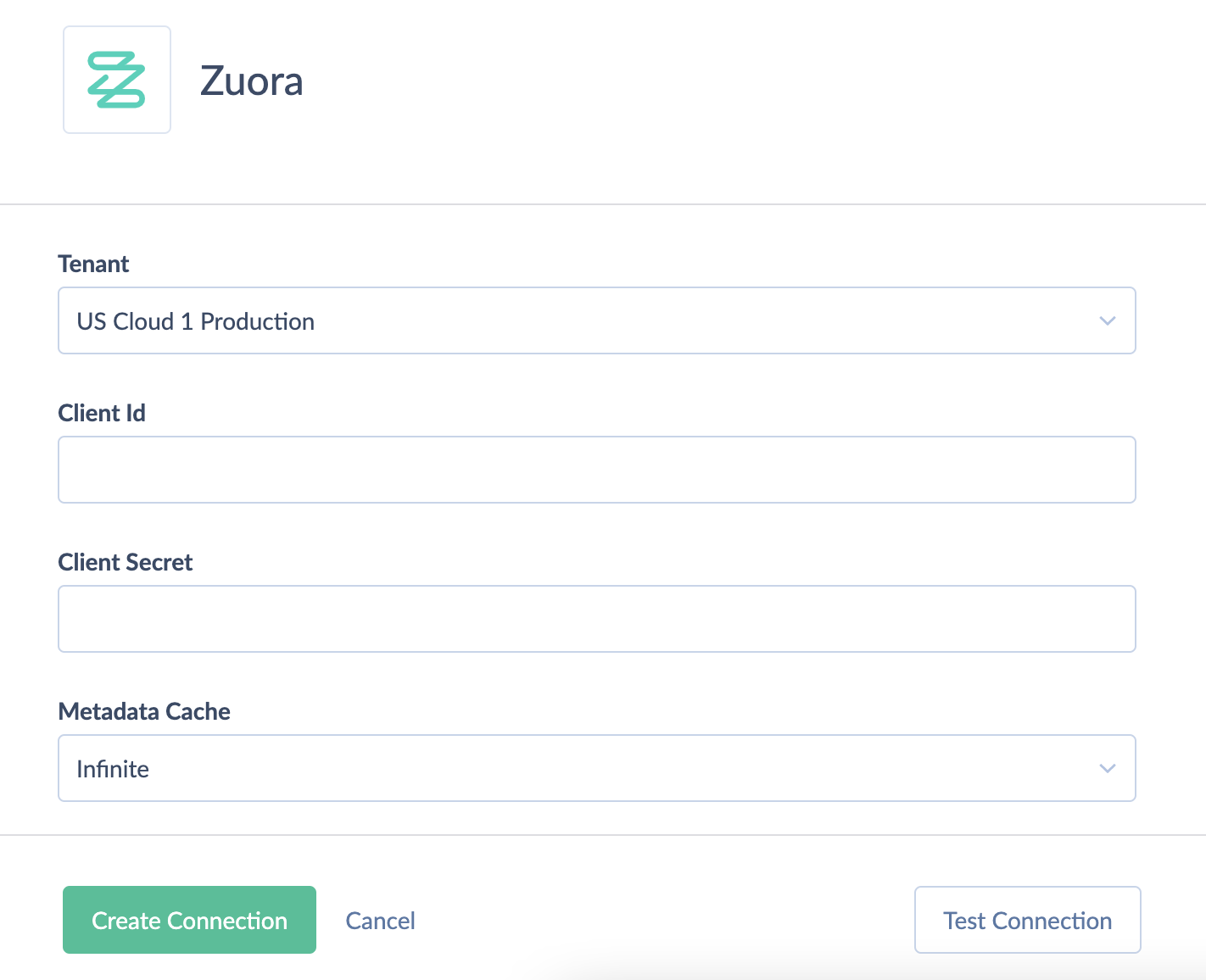Zuora
Zuora is the leading monetization platform for businesses to launch and manage subscription-based services.
Data integration: Skyvia supports importing data to and from Zuora, exporting Zuora data to CSV files, and replicating Zuora data to relational databases. It does not support synchronizing Zuora data with other cloud apps and relational databases.
Backup: Skyvia Backup does not support Zuora.
Query: Skyvia Query supports Zuora.
Establishing Connection
To create a connection to Zuora, choose an appropriate Tenant from the list and fill out Client Id, and Client Secret.
Getting Credentials
To get Client Id and Client Secret, create a new OAuth Client by following the steps listed below:
- Login to Zuora.
- Click on the user icon.
- Go to Administration > Manage Users > Your User > New OAuth Client.
- In the New OAuth Clients section, enter a name for the OAuth client.
If you have the Multi-entity feature enabled, select which entities the OAuth client will be permitted to access.
- Click Create.
- Zuora displays the Client ID and Client Secret for the OAuth client. These values are displayed only once, so make sure to copy them.
- Click OK.
Creating Connection

To create a connection between Skyvia and Zuora:
- Choose the appropriate Tenant value from the dropdown.
- Enter Client Id and Client Secret.
- Click Create Connection.
Additional Connection Parameters
Metadata Cache
The period of time after which Metadata cache is considered expired.
Entity
If Zuora Multi-entity is enabled, select an entity to connect to from the dropdown.
Connector Specifics
Synchronization and Incremental Replication
Synchronization and Replication with Incremental Updates enabled are not supported for objects without CreatedDate or UpdatedDate fields. Both fields must be present for synchronization. Replication with incremental updates requires at least one of the fields.
Objects That Support Synchronization
Custom objects, AccountingCodes, AccountingPeriods, Accounts, Contacts, Features, Invoices, PaymentMethods, PaymentRuns, Payments, ProductRatePlans, Products, Refunds, TaxationItems, UnitOfMeasures, Usages.
Objects That Do Not Support Incremental Replication
EventTriggers, InvoiceFiles, InvoiceItems, InvoiceTaxationItems, OrderLineItems, PaymentGateways, PaymentMethodTramsactionLogs, PaymentRunData, SequenceSets.
Object Peculiarities
-
Custom objects are fully supported.
-
The ProductRatePlanCharges object does not support the INSERT operation.
-
Some of the PaymentMethods object fields are masked to hide sensitive information, such as credit card numbers or bank account numbers. This means that you can load data into these fields, but when you query the values of these fields, they are returned with the asterisks instead of actual characters. There is no way to retrieve the complete values via Zuora API.
-
The following objects are considered deprecated in Zuora API and are implemented as read-only in Skyvia: CreditBalanceAdjustments, InvoiceAdjustments, InvoiceItemAdjustments, InvoicePayments, RefundInvoicePayments.
-
In the CreditMemoItems and DebitMemoItems objects, the SourceItemId field is not implemented. This field can refer to different objects, depending on the method used to create the credit memo item. Instead, there are the InvoiceId, ProductRatePlanChargeId, and RatePlanChargeId fields.
-
Some fields in Zuora can be obtained only with an additional request. If you query such field, an additional API call is performed for each queried record. It is recommended to exclude these fields if they are not needed. These are the following fields: the InvoiceItems field of the Invoices object, the Body field of the InvoiceFiles object, and Data field of the PaymentRuns object.
-
The following Zuora objects are not supported: Credit Taxation Items, Debit Taxation Items, AccountInvoices, AccountPayments, Catalog Groups, Payment Method Credit Cards, AccountAttachments, InvoiceAttachments, SubscriptionAttachments, CreditMemoAttachments, DebitMemoAttachments.
Supported Actions
Skyvia supports all the common actions for Zuora.